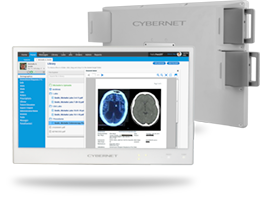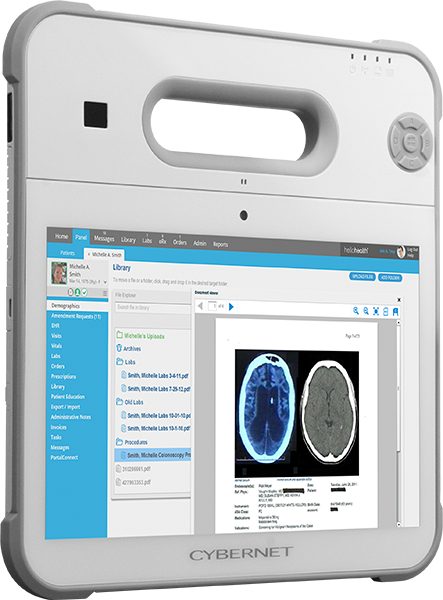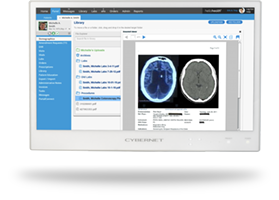A modern hospital is a monstrously complex system of patients, healthcare providers, and medical equipment. Tracking and managing all of these elements can quickly become impossible.
That’s why many hospitals turn towards RFID technology to track and manage patients, equipment, medication, and more. Properly used, RFID in healthcare can reduce the chance of medical errors and deliver a better patient care experience.
What is RFID Technology?
RFID stands for Radio Frequency Identification. At its simplest, it is a type of wireless communication that uses radio frequencies to identify an object.
RFID systems consist of three components: an antenna, a transceiver, and a transponder. The antenna and transceiver work together as an RFID reader, transmitting signals to the transponder in an RFID tag. When the tag is activated, it transmits information back to the reader.
The most significant advantage of RFID technology is its lightweight and low-profile design. RFID tags are incredibly small and lightweight, with most the size of a button or name tag. Tags can even be woven into fabric or attached to objects via stickers. By tracking objects through their attached tags, the owner can always know the object’s location.
Applications for RFID in Healthcare
Thanks to its small footprint, RFID tech is extremely flexible and easy to implement in healthcare. Some of the most common applications for RFID in healthcare include:
Patient and Asset Tracking
One of the most important tasks for a hospital is keeping track of its patients and the equipment that providers use. Some hospitals issue RFID wristbands or tags for patients to wear, which healthcare providers can track and identify. This is especially useful for high-risk patients, such as seniors with Alzheimer’s. Applying this system to newborn babies also helps ensure infants aren’t accidentally switched at birth.
Equipment tracking is critical for hospitals, considering they lose an estimated 10-20% of their assets every year. Losing track of a stethoscope is one thing; misplacing a medical computer that costs thousands of dollars is another. RFID tags can be attached to assets and equipment to track their location in real-time, preventing them from being misplaced or stolen.
Medication Management
Giving the wrong medication to patients can have serious side effects. To prevent this, providers will attach RFID tags to medication bottles and then scan them with an RFID reader attached to a medical computer. The computer will then refer to the patient’s electronic health record to check if the bottle contains the correct medicine for that patient.
Security Access Control
Under the Healthcare Insurance Portability and Accountability Act (HIPAA), healthcare groups are responsible for data security and privacy. This means they must control who can access patient health records and prevent this information from falling into the wrong hands.
Groups can accomplish this by using all-in-one medical PCs with built-in RFID readers and issuing tags to their staff. By scanning their tags with the reader, staff can verify their identity and ensure access control.
Inventory Management
Hospitals constantly use consumable medical equipment, such as bandages and blood bags. To prevent shortages and track usage, they can attach RFID tags to these consumables. This lets them know exactly how many they have in stock and when they need to place an order for replacements.
Benefits of Using RFID Technology in Healthcare
The accuracy and tracking that RFID technology offers brings numerous benefits to healthcare, with the most important being:
Better Patient Safety
Protecting patients and preventing accidents is the highest priority for any healthcare system. By double-checking RFID-tagged medication against a patient’s EHR, providers can ensure that they administer the correct doses to the correct patients.
RFID also enables closer patient monitoring, with RFID tags automatically tracking their position throughout the hospital. If a patient gets out of bed or tries to wander into a restricted area, the tag can automatically alert providers. This lets them intercept the patient before someone gets hurt.
Loss Prevention
With the average lost equipment costing hospitals $3,000 per item, any amount of loss prevention goes a long way in saving hospitals money. Loss prevention also ensures that healthcare providers always have the necessary tools to treat patients.
Regulatory Compliance
HIPAA regulations are strictly enforced, and violations can result in fines of over $2 million. For criminal levels of neglect, jail time of up to 10 years is a possibility. Therefore, maintaining regulatory compliance is critical for healthcare groups. RFID-based access control is an excellent step towards maintaining HIPAA compliance for security and privacy.
Considerations for Using RFID Tech
Like any other piece of technology, implementing RFID in healthcare comes with its own set of hurdles and considerations. The most important factors that you have to think about are:
Cybersecurity
Given the repeated emphasis on security and privacy, it’s reasonable to ask if RFID tech can be used as a backdoor to access private health information. The answer is that while it is technically possible, cybercriminals have other methods that are easier and more reliable. Most cyberattacks come from phishing, where criminals trick healthcare providers into sharing their login credentials.
Hacking into RFID-based technology would require physically sabotaging the tags and readers. This is something most hackers don’t have the time or opportunity to do. RFID technology’s security can be reinforced with medical-grade computers that scan tags and prevent intrusions.
Integrating RFID Into Pre-Existing Systems
Another concern that healthcare groups have is integrating RFID into their pre-existing structure. Many hospitals still rely on older equipment that is still functional but no longer supported by the original manufacturer.
Upgrading to modern computers to take advantage of RFID tech could mean abandoning these older pieces of equipment. The best way to address this issue is by using medical computers that have both modern and legacy ports, letting providers use both new and old equipment with them.
Upfront Cost
The last major concern for implementing RFID is the upfront cost of new equipment. While purchasing new medical computers is a significant investment, there are ways to lessen that cost. One of the best ways is to work with an original equipment manufacturer (OEM). OEMs can customize their products to better fit your needs, ensuring you find the right balance between your performance needs and your budget.
RFID-Capable Computers from Cybernet Manufacturing
RFID technology can drastically simplify a hospital’s operations and make treatment safer for patients. If you’re looking for medical tablets or computers that can integrate RFID readers, contact the team at Cybernet Manufacturing. We’d be happy to explain how our products, along with their integrated RFID readers, can help your healthcare group.


